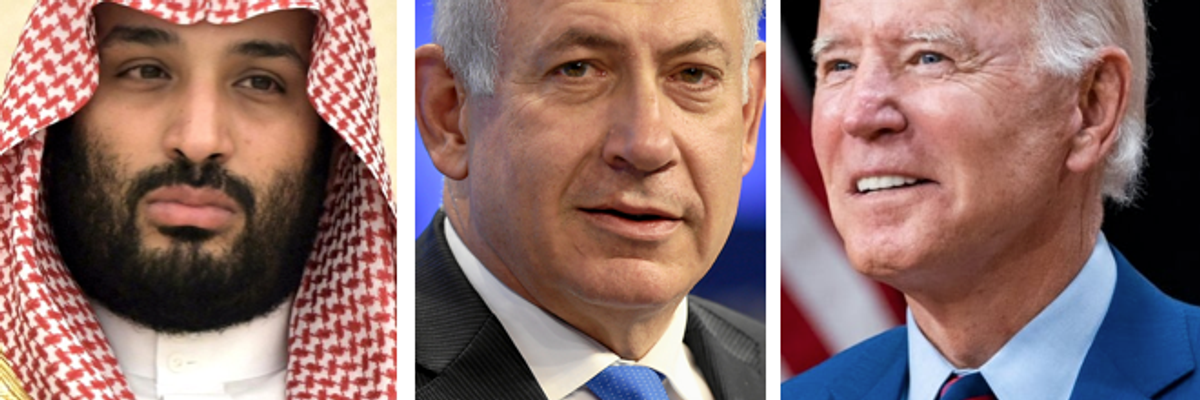The Biden administration is currently considering going where no other president has gone before: offering a formal security guarantee to Saudi Arabia and helping the kingdom develop a civilian nuclear program in return for Riyadh normalizing relations with Israel.
President Biden and his team argue that the United States has a national security interest in brokering such a deal, even if that means massive and unprecedented concessions to Riyadh.
Biden and his team are wrong. Entering into a mutual security agreement with Saudi Arabia would represent a catastrophic miscalculation. A security guarantee for Saudi Arabia would entrap Washington as Riyadh’s protector despite a fundamental disconnect between the interests and values of the United States and the kingdom.
Saudi Arabia seeks increased security commitments in return for formally normalizing relations with Israel, a country with which it is already strategically aligned. This is part of a deliberate strategy by Saudi Crown Prince Mohammed bin Salman (MbS) to exploit growing fears in Washington that the United States is losing influence in the Middle East relative to other actors such as Russia or China.
As the Wall Street Journal reported, “in private, Saudi officials said, the crown prince has said he expects that by playing major powers against each other, Saudi Arabia can eventually pressure Washington to concede to its demands for better access to U.S. weapons and nuclear technology.”
And yet, though Russia and China have expanded their respective footprints in the Middle East, neither Moscow nor Beijing can fill an American void in the Middle East, nor do they desire to. States within the region are aware of the limitations facing Russia and China. Saudi Arabia and other U.S. regional partners have cultivated Washington’s anxiety about losing its position relative to Russia or China and are pressing for major policy concessions, resulting in a type of “reverse leverage.”
The pinnacle of this reverse leverage strategy is the peekaboo game MbS is playing with the United States over whether Saudi Arabia will join the so-called Abraham Accords. Since the introduction of the Accords in 2020 by President Donald Trump – which witnessed Israel formally normalize relations with Bahrain and the United Arab Emirates (UAE), later expanded to also include Sudan and Morocco – U.S. and Israeli officials have been determined to add Saudi Arabia to the mix.
The Abraham Accords have become the new “lodestar” of U.S. foreign policy in the Middle East. Through these series of normalization deals, the United States hopes to create a more formal coalition through which it believes it can best advance its interests, namely by maintaining its regional influence amid Russian and Chinese “encroachment” while also allocating more attention to other global theaters such as Eastern Europe and the Pacific.
However, regional actors are increasingly using the Accords as a mechanism to keep the United States entangled in the region as the continued guarantor of their security. The Arab states that joined the Abraham Accords were granted considerable policy concessions for doing so without any serious debate as to whether such tradeoffs served the interests of the United States. They interpret the Accords as a mechanism for maintaining the regional status quo – with more concrete and integrated U.S. security guarantees undergirding it.
This is precisely the lens through which Riyadh views its possible entry into the Abraham Accords: as a way to pressure the United States into granting the kingdom sweeping concessions and guaranteeing Washington remains its ultimate protector over the long term. Washington’s ongoing support for actors like Saudi Arabia has resulted in a vicious cycle: by committing itself to propping up the underlying sources of regional instability, the United States repeatedly finds itself having to confront challenges that are largely the product of its own presence, policies, and partners in the Middle East. Making things even more obscene, Washington may be deepening its commitment to these illiberal states at a time when it has become clear that the region hardly matters to U.S. national security.
The United States must decide whether it will continue underwriting actors such as Saudi Arabia and the artificial status quo in the Middle East, or whether it will recognize the failures of its own policies and limit its involvement to a level commensurate with U.S. interests.
- It's a bad idea for Biden to broker Saudi-Israeli normalization ›
- A security pact with Saudi Arabia would be a disaster for US interests ›
- Biden needs to stop coddling Bibi - Responsible Statecraft ›
- Senate has days to block new weapons sale to Saudi Arabia - Responsible Statecraft ›
- Don't be fooled, push for normalization is about US dominance | Responsible Statecraft ›
- MBS: No Saudi-Israel normalization until Palestinians get a state | Responsible Statecraft ›
- No Joke: US considering nuclear power for Saudi in grand bargain | Responsible Statecraft ›
















